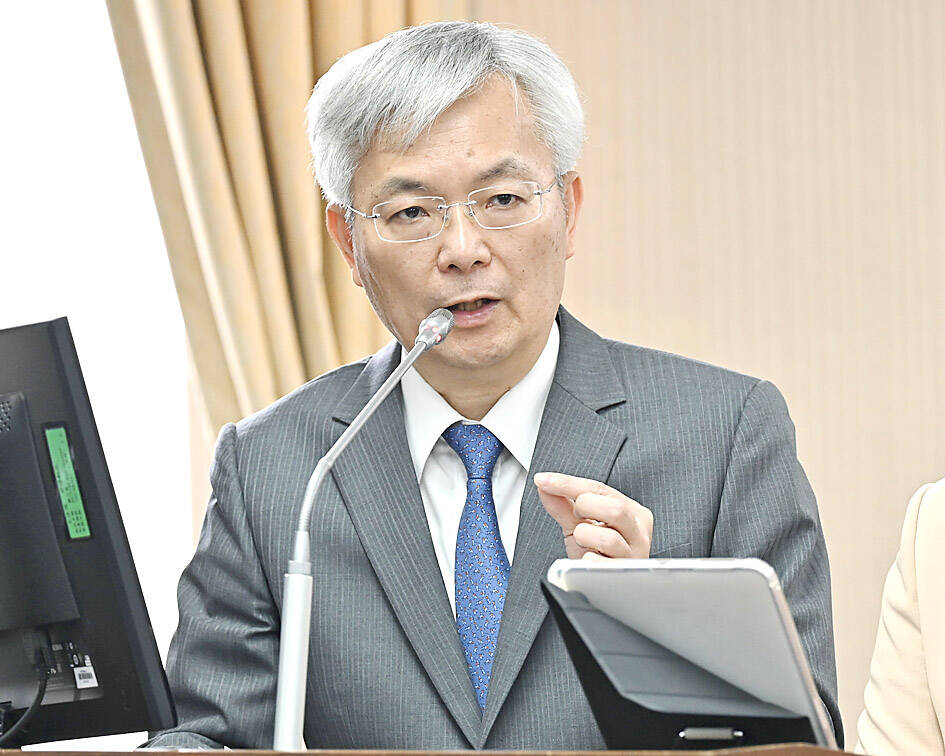Allegations the police would triangulate and track the mobile phones of protesters are false, National Police Agency Director-General Chang Jung-hsin (張榮興) told the legislature’s Internal Administration Committee yesterday.
Minister of the Interior Liu Shyh-fang (劉世芳) also told the committee that she was unaware if anyone was handling or obtaining such information at the ministry.
Chinese Nationalist Party (KMT) Legislator Chang Chih-lun (張智倫) asked about Democratic Progressive Party (DPP) Policy Committee director-general Wang Yi-chuan’s (王義川) comments on a political talk show that protesters could be located based on their phone signals and such information could be used to analyze the ages of those protesting outside the Legislative Yuan.

Photo: Tu Chien-fa, Taipei Times
Wang on a SET News TV show added that the people gathered in front of the Legislative Yuan on Tuesday did not overlap with those who participated in the Sunflower movement in 2014.
Chang said that the police would not attempt to track members of the public via phone signals, adding “most certainly not” for emphasis.
Chang said he did not know who would have access to such information.
Liu said she mostly paid attention to how the police maintained law and order during protests, adding that she was also unclear whether anyone was handling or obtaining telecom data at the ministry.
When asked by Chang whether she supported legislative reform, she said she supported such changes as long as they are constitutional.
Separately, National Communications Commission Secretary-General Huang Wen-che (黃文哲) yesterday said that the commission was unclear about the situation or how Wang obtained the data.
The commission said it would launch an investigation into whether the three major telecoms illegally collected and used personal information.
Using geolocation services on phones to estimate the number of attendees at events is a known fact, Huang said, adding that people were more concerned about whether personal information had been leaked.
If the data cited by Wang served only to reference the number of people gathered in an area it would not fall under the jurisdiction of the Personal Data Protection Act (個別資料保護法), he said.
He said the commission would have to investigate the issue to determine whether personal information had been leaked and whether the Personal Data Protection Act had been contravened.
Huang said that the commission had received a complaint regarding the SET News report for failure to verify its sources.

Taiwanese can file complaints with the Tourism Administration to report travel agencies if their activities caused termination of a person’s citizenship, Mainland Affairs Council Minister Chiu Chui-cheng (邱垂正) said yesterday, after a podcaster highlighted a case in which a person’s citizenship was canceled for receiving a single-use Chinese passport to enter Russia. The council is aware of incidents in which people who signed up through Chinese travel agencies for tours of Russia were told they could obtain Russian visas and fast-track border clearance, Chiu told reporters on the sidelines of an event in Taipei. However, the travel agencies actually applied

Japanese footwear brand Onitsuka Tiger today issued a public apology and said it has suspended an employee amid allegations that the staff member discriminated against a Vietnamese customer at its Taipei 101 store. Posting on the social media platform Threads yesterday, a user said that an employee at the store said that “those shoes are very expensive” when her friend, who is a migrant worker from Vietnam, asked for assistance. The employee then ignored her until she asked again, to which she replied: "We don't have a size 37." The post had amassed nearly 26,000 likes and 916 comments as of this

New measures aimed at making Taiwan more attractive to foreign professionals came into effect this month, the National Development Council said yesterday. Among the changes, international students at Taiwanese universities would be able to work in Taiwan without a work permit in the two years after they graduate, explainer materials provided by the council said. In addition, foreign nationals who graduated from one of the world’s top 200 universities within the past five years can also apply for a two-year open work permit. Previously, those graduates would have needed to apply for a work permit using point-based criteria or have a Taiwanese company

The Shilin District Prosecutors’ Office yesterday indicted two Taiwanese and issued a wanted notice for Pete Liu (劉作虎), founder of Shenzhen-based smartphone manufacturer OnePlus Technology Co (萬普拉斯科技), for allegedly contravening the Act Governing Relations Between the People of the Taiwan Area and the Mainland Area (臺灣地區與大陸地區人民關係條例) by poaching 70 engineers in Taiwan. Liu allegedly traveled to Taiwan at the end of 2014 and met with a Taiwanese man surnamed Lin (林) to discuss establishing a mobile software research and development (R&D) team in Taiwan, prosecutors said. Without approval from the government, Lin, following Liu’s instructions, recruited more than 70 software